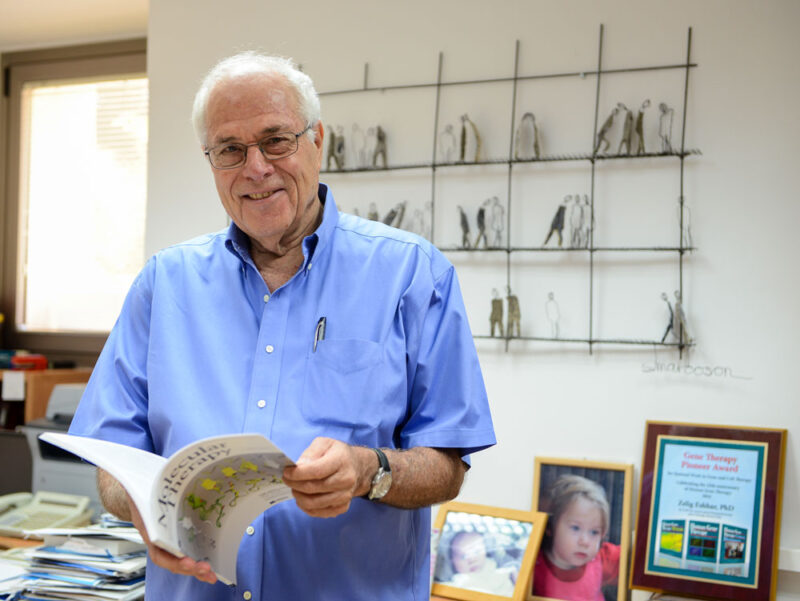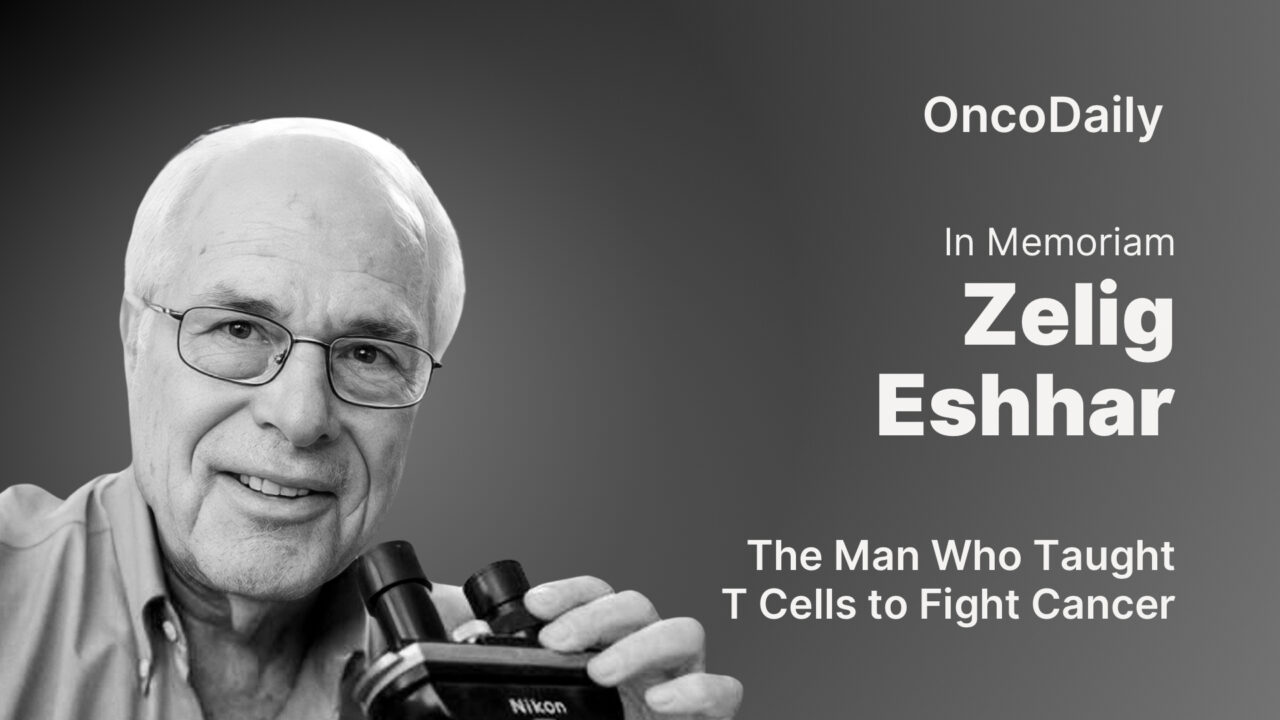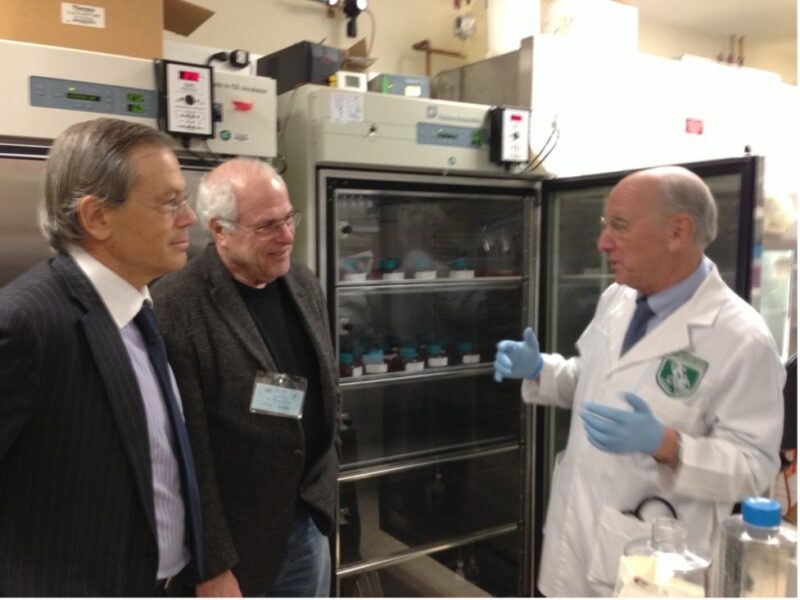Zelig Eshhar, PhD, one of the foundational figures in cancer immunotherapy and the scientist behind the concept of chimeric antigen receptor (CAR) T-cell therapy, passed away on July 3, 2025, at the age of 84. His work reshaped the way the world understands the immune system’s potential to fight cancer and continues to save lives today.
Early Life and Education
Born in 1941 in Petah Tikva, Israel, Eshhar grew up in Rehovot as the eldest of four children. His parents, Yaakov and Sarah Lipke, had immigrated from Poland. After completing military service in the Nahal Brigade and spending time on Kibbutz Yad Mordechai as a beekeeper, he set his sights on science. He studied biology at Tel Aviv University and later earned his PhD in immunology from the Weizmann Institute of Science in 1975.
Engineering the Future of Cancer Treatment
In 2024, Zelig Eshhar was awarded the prestigious Canada Gairdner International Award, alongside Dr. Michel Sadelain, for their seminal contributions to the conception, development, and application of CD19-CAR T cell therapy for cancer.
Eshhar’s pioneering work in T-cell genetic engineering, coupled with Sadelain’s later refinements, formed the scientific foundation of this transformative therapy. Their trailblazing research defined the modern pathway of cellular immunotherapy.
CAR T-cell therapy uses genetically modified T cells to locate and destroy cancer cells. Eshhar was the first to construct synthetic receptors capable of directing T cells to tumor targets—what we now call chimeric antigen receptors (CARs). Sadelain subsequently built on this work to develop second-generation CAR T cells targeting CD19, a molecule found on B cells, demonstrating their ability to cure leukemia in preclinical models.
Today, CAR T-cell therapies are approved globally for several relapsed or refractory B-cell malignancies, including acute lymphoblastic leukemia and large B-cell lymphoma. These therapies can induce long-term remission after a single treatment, offering a level of durability and precision previously unseen in oncology. Research continues to explore their potential in treating autoimmune diseases, fibrotic disorders, and infectious conditions.
While Eshhar’s early work faced skepticism, his persistence and vision ultimately led to global recognition. Over time, his research was validated and expanded by scientists and clinicians worldwide. Major pharmaceutical breakthroughs in CAR T-cell therapy, such as those by Novartis and Kite Pharma can be traced directly to the foundational innovations from his laboratory.
In recognition of his lifetime contributions to science and medicine, Eshhar also received the Israel Prize in Life Sciences and the CAR-TCR Distinguished Scientist Award. These honors reflect the global appreciation for a scientist whose ideas moved from lab bench to bedside, transforming cancer care and saving lives.
A Global Impact and Scientific Legacy
Zelig Eshhar’s research reshaped the world of oncology. He proved that immune cells could be engineered to not just fight cancer, but to remember it, persist, and prevent recurrence. This shift from “chemotherapy” to “cell therapy” changed the lives of countless patients and inspired a generation of scientists.

Mentor, Innovator, and Humanitarian
Beyond the lab, Eshhar was a passionate educator and mentor. He trained and inspired dozens of young scientists at the Weizmann Institute and Tel Aviv University. Colleagues remember him as visionary yet grounded, rigorous yet kind, and deeply committed to the real-world impact of his research.
His collaborative spirit and unwavering belief in science’s power to heal lives remain at the core of his legacy.
A Life That Changed Lives
Zelig Eshhar’s passing marks the end of an era in cancer research, but his legacy lives on in every patient treated with CAR T-cell therapy. His vision turned into a global medical breakthrough, giving hope to those once considered untreatable.
He leaves behind a world forever changed by his work and a future still unfolding in the shadow of his remarkable discoveries.
Remembered by the Scientific Community
Zelig Eshhar’s passing reverberated throughout the global scientific and medical communities. Colleagues, collaborators, and leaders in the field of immunotherapy shared heartfelt tributes, many of which highlighted not only his scientific brilliance but also his humility, vision, and generosity of spirit.
Arie Belldegrun, MDArie Belldegrun, MD:
“A Tribute to Dr. Zelig Eshhar: A Founding Father of CAR T and a Pioneer of Medical Independence
This Fourth of July weekend, a time when freedom and new beginnings are celebrated, we mourn the loss of one of science’s great liberators, Dr. Zelig Eshhar. His passing is deeply personal to me and profoundly impactful forthe field of cancer immunotherapy.
Zelig was more than a scientist. He was a visionary who redefined what was possible in cancer treatment. As the “father” of CAR T therapy, he broke the bounds of conventional oncology and empowered the immune system to do what it was always meant to do: fight cancer. His pioneering work on chimeric antigen receptors, which began at the Weizmann Institute of Science in Israel and continued at the National Cancer Institute (NCI) at the The National Institutes of Health under another cancer legend, Dr. Steve Rosenberg, M.D., Ph.D., sparked a revolution that now brings hope to thousands of patients worldwide.
In December 2013, Kite Pharma licensed the groundbreaking CAR constructs Zelig had pioneered, forming the scientific backbone of our mission. His trust in our team was instrumental in building Kite, and he served on our Scientific Advisory Board with the humility and wisdom of a true giant. I will never forget
when Zelig signed his agreement with Kite and inscribed a 50-shekel note in front of Ran Nussbaum, a fellow board member, and I, to mark “a new beginning” for CAR T therapy. Though small in size, that note carries monumental symbolic value – a belief in a better future.One of my most cherished photographs is from 2013, standing with Dr. Zelig Eshhar and Dr. Rosenberg, two visionaries who helped launch a new chapter in medicine. That image captures more than a historic moment; it marks the start of a true paradigm shift. I knew I was among giants, but I didn’t yet grasp how life-changing that moment would be. It was Zelig who first showed us how to combine the precision of antibodies with the power of T cells, creating a therapeutic approach that would redefine what’s possible, not just in oncology, but across the spectrum of disease.
The Fourth of July celebrates independence. How fitting that we remember Zelig on this day, a man who gave medicine its own independence from the limitations of traditional cancer therapies. His legacy is not just in the patents he held or the publications he authored, but in every patient who now lives longer, stronger, and freer because of CAR T cell therapy.
To me, Zelig Eshhar will always be remembered not only as a pioneering scientist but also as a quiet hero, a generous mentor, and a dear friend. We honor him not just with words, but with action, by continuing to build, to innovate, and to carry forward the mission he began.
Zelig, your vision endures in every cell, every cure, and every life saved.
Arie Belldegrun, M.D.”
“I am saddened to hear of the passing of Dr. Zelig Eshhar, a giant in the field of immunology. I was fortunate to work alongside Zelig at the National Cancer Institute (NCI) during the early days of CAR T cell research. I remember fondly many late nights in the lab together, running experiments that paved the way for using CAR T cells against cancer. Zelig was a true pioneer, brilliant scientist and friend, and his impact will be felt for generations.”
“Honoring Zelig Eshhar: Remembering a Kind Mentor and Pioneer of CAR T-Cell Therapy
I want to take a moment to remember Prof. Zelig Eshhar, who passed away July 3rd. Many know him as the pioneer of CAR T-cell therapy, but to me, he was also a generous mentor and colleague.
When I moved from MSKCC to the NCI in 1989, I had the good fortune of arriving just before Zelig began a sabbatical there. We worked in the same lab at the same time, and I was able to learn from him directly.
Zelig Eshhar was a remarkable fusion of patience and toughness – qualities honed as a soldier and nurtured as a beekeeper. With the disciplined determination of someone who once wore a military uniform and the quiet persistence cultivated among the bees, he pursued his scientific goals relentlessly. Single-minded in his vision, he embraced challenges with unwavering resolve, never backing down from obstacles that others might have found daunting. Eshhar was gentle enough to tend to bees but tough enough to change the face of immunotherapy, embodying a rare combination of grit, patience, and an unstoppable drive to innovate.
Back then, Zelig called what became known as CAR-T cell “T bodies.” Most folks in 1990 thought that the T body idea was ridiculous and they weren’t shy about arguing with him. He was deeply knowledgeable about antibody structures, which he learned in Cesar Milstein’s lab around the time (mid 1970’s) that Milstein was fleshing out making monoclonal antibodies that would earn him the Nobel Prize a decade later, so it was tough for anyone to beat him in a debate. Maybe if Zelig had lived on for a few more years, he would get his own Nobel Prize.
He also loved the details of what cells were best for these chimeric antibody-like structures. He taught me to recognize “good-looking” T cells that we later would learn have pleiomorphic functional capacity. He even had a name for them – he called them “tsubchicks,” I never could figure out what that name meant, but it was a playful term (perhaps with a bit of Hebrew or Yiddish flavor) that showed both his affection for the cells and his knack for making science memorable.
Turns out, he had an intuitive understanding that the less differentiated T cells, which over a decade later we would call TCF1+ T memory stem cells (Tscm) had the appearance he taught me to spot.
Zelig’s work changed cancer treatment forever. But I’ll remember most the generosity with which he shared his ideas and time. I feel lucky to have known him.
Let’s remember and honor the scientists who inspire us not just with their discoveries, but with their humanity. If you knew Zelig or his work inspired you, please feel free to share your memories or reflections here.”
Written by Nare Hovhannisyan, MD



